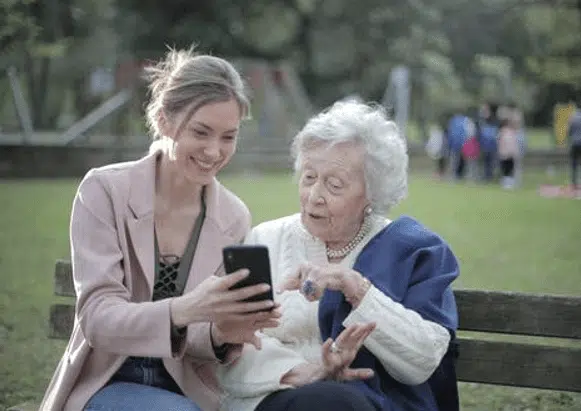Holiday Gatherings and Dementia
Posted in Senior Health Care Tips
With the holiday season underway and many families reuniting for the first time in nearly two years, this year’s holiday gatherings feel more important than ever.
Family gatherings are cherished moments, but can become extremely stressful for loved ones experiencing dementia, especially if this is the first year where the condition becomes noticeable to others.
Below are some simple steps eldercare and dementia experts suggest your family consider to ensure everyone in the family can celebrate together in comfort, along with examples of what these strategies may look like at the dinner table. 
It is important to remember that your love and attention are the most valuable gifts you can give to your family members as well as helping your elders to feel included in whatever ways they can participate.
-
Before the Celebration:
-
- Keep the person’s daily routine in mind when planning/scheduling holiday events including meal and medication schedules.
- Plan event times when the person is most alert and not likely to be overtired or easily overwhelmed.
- When attending an event, identify a “quiet space” for the person to relax if they are tired and/or able to re-group if overwhelmed.
- Consider if the person needs to be present for the whole event or part of the event.
- Limit or prohibit alcoholic and caffeinated drinks which will adversely impact the person’s physical and emotional status and their responses to stimuli and stressors.
- Identify one or two people who will assist the person throughout the event. You may want to include a paid caregiver who has personal care skills including toileting or changing incontinence briefs, transfers and assistance with ambulation. Make sure to review expectations with the paid caregiver before the event.
- If you cannot determine a good way to keep your loved one comfortable, consider bringing a smaller gathering to their home with premade food and disposable plates and cutlery to avoid leaving a mess.
Idea: If the person has difficulty remembering names of friends/relatives, family or friends can take turns sitting next to the person and “introducing” people.
Idea: Determine who will be in charge of medication and emergency numbers if needed.
Idea: Determine who is going to drive the person home and ensure they are able to resume their daily schedule upon returning home.
-
Ensure a Safe Environment
-
- Avoid safety hazards (tape down extension cords, tack down throw rugs, find alternatives to lighted candles)
- Be aware that some decorations may look like food items and confuse the person.
- Lower the risk of confusion and agitation by Minimizing flashing lights and loud music. Consider having a room for loud conversation and music and a quieter room to provide a calmer atmosphere.
- Make sure there is a suitable, stable chair with arms to assist the person getting in and out of the chair.
-
Adapt Past Favorite Traditions Or Create New Ones
-
- Modify an activity to include the person and focus on their strength rather than dwell on their deficiencies.
- Plan meaningful activities that engage the person. It is not the quantity but the quality. Prioritize the activities to help scale down stressors.
- Make holiday traditions intergenerational. Time and memories shared between generations is special. Encourage children and grandchildren to spend time focusing on a simple tradition
- Tell guests ahead of time what activities you have planned or suggest something they might bring, such as a photo album or family recipe book to promote conversation.
Idea: For people who enjoyed holiday baking, consider baking tasks that meet their abilities such as decorating the cookies or reminiscing about cookies they made for past holidays.
Idea: Buy frozen pre-made cookie dough for the person to cut or shape and decorate.
Idea: Old fashion sing-a-long? Print out the words for everybody!
Idea: Holiday cards to be mailed? Assist the person in writing one short note and make copies to be included in all the cards.
-
Update Friends and Family
-
- Have an honest conversation with family members ahead of time about any changes in behavior, health, or memory since their last visit with the person. Doing so gives others time to think about how they will respond to the person.
- Provide communication suggestions on how to best approach the person taking in frailties. In general, eldercare experts suggest the following:
- Approach gently and calmly.
- Speak on the person’s level to make eye contact (both sitting and face to face.)
- To touch or not to touch may need to be discussed.
- Reminiscing about past holidays may be a safe topic, but be aware of the person’s reception of the topic and move to a different subject if the person shows a level of agitation.
- Don’t patronize or infantize your conversations with the person.
- A loved one with dementia may ask about a family member who is not present because they have passed away. Be sensitive about these conversations and have a plan for how to handle these topics. Sometimes coming up with another reason for a person’s absence may be the best way to avoid causing your loved one pain.

Idea: Starting a conversation “Remember when… “may cause frustration because the person cannot remember the past event.
Try starting with “I remember when…”this allows the person to search calmly for the memory of the event and choose to join in or not.
Idea: “Do you remember me?” It can be distressing when somebody doesn’t recognize you, but remember that the feeling is mutual. Asking the person if they know who you are can make them feel guilty if they don’t remember or offended if they do. Try instead to greet the person with a warm hello and take it from there.
Coming together for the holidays
Holiday gatherings are an emotional time for many families, especially after lengthy time away due to the pandemic. By considering the steps above, you can help ensure your latest family gathering is a happy event for all, even if a loved one has undergone significant changes since the last function.
If cognitive changes in a loved one are proving challenging for your family, now might be the time to contact SelectCare and consider how home health care specialists with experience caring for those with dementia may benefit your family this holiday season.
